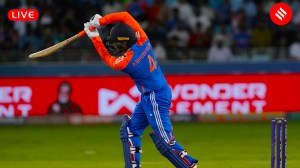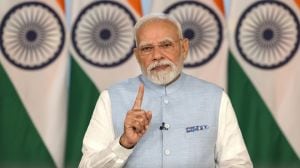Senegal’s win: pile on metaphors and symbols
At 9 p.m. Seoul time, you could almost see the catharsis in the World Cup Stadium. The pain of two centuries of French rule — brutal ru...

At 9 p.m. Seoul time, you could almost see the catharsis in the World Cup Stadium. The pain of two centuries of French rule — brutal rule, say Senegalese journalists here — were softened considerably when Papa Bouba Diop bundled the ball into the net. No matter that more elegant goals have scored in World cup history; for Senegal, this would do nicely, thank you.
It seemed almost as if they’d won the cup. As Diop and some of his teammates celebrated on the far corner, defender Omar Daf immediately dropped to his knees and kissed the ground. It was that kind of a moment.
| What a start: Goalkeeper Fabien Barthez after France lost to Senegal — playing its first ever World Cup. Reuters |
The tension had been building up much before the opening ceremony got under way. The fans were at opposite ends; the French, several hundred of them, to the left (the end where the goal was scored); to the right, the Senegalese, fewer in number but louder.
And they had the backing of the Koreans, who know a thing or two about brutal occupation. That end of the stadium was Senegal yellow, the flags complemented by the t-shirts the spectators were wearing.
On the pitch, the tension was obviously far greater. Ties between the two nations go back a long way, and 42 years since winning their freedom, the Senegalese maintain strong links with their former rulers. More loyal than the king, perhaps.
Consider this: Only one of the French players in the starting line-up play in the home country. In the Senegal team, all 11 play in France, as do nine of the others.
French star Patrick Vieira was born in Senegal, of course, but you can bet they weren’t singing the Arsenal song in the dressing-room (‘‘Vieira, whooah, he comes from Senegal, he plays for Arsenal’’).
Out in the middle, he seemed to come in for some extra attention. At one point, he was even pushed out of the wall when the French had a freekick. (And anyone who’s watched Vieira play knows that takes some doing). The match itself was strange. France seemed too tense, weighed down by the pressure of being holders and of having to play without Zinedine Zidane. They rolled over and allowed Senegal to dictate terms. The usual bite, the champions’ confidence, was replaced by a feeling that bordered on fear. It was almost like they were willing the match to be over, and fast.
Yet they were world and European champions and it seemed they must score. They had enough opportunities.
In just the last 12 minutes Henry, Trezeguet, Desailly, Lebeouf, Henry again all had a chance to redeem their team. Something stopped them. Well, that’s what the Senegalese were praying for, too. Before the match Souleymane Thiam, a journalist with Nouvel Horizon in Dakar, told me confidently his team would win. No two ways about it; it was natural justice that France be beaten.
After that, there’d be a big party. At half-time, despite his team being ahead, he appeared distracted. As time went on and the drums from the Senegal side became more fevered, Souleymane seemed almost in another world. Then Al-Bujsaim blew the final whistle and the dam broke.
This isn’t, of course, the end of the World Cup for France. Trust them to bounce back soon enough. But a tiny part of Africa, poorer beyond imagination, which exists to us only in dreary geography classes, will take plenty of heart from Seoul. Football scores again.
Photos



- 01
- 02
- 03
- 04
- 05



























